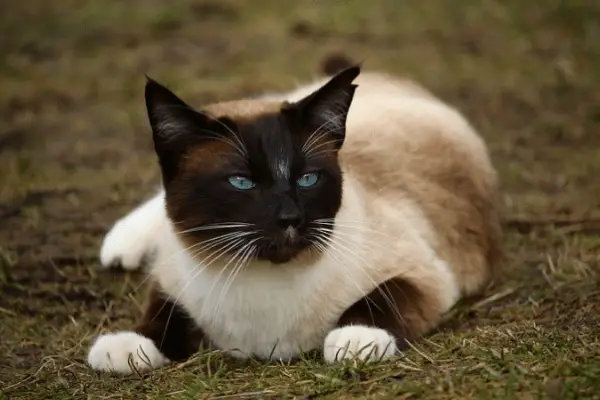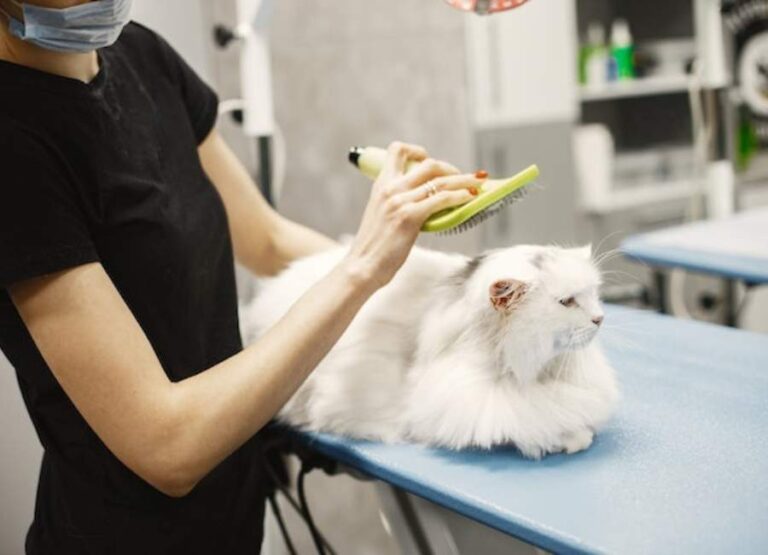When Do Cats Sleep The Most [Answered]
![When Do Cats Sleep The Most [Answered] When Do Cats Sleep The Most](https://petcreeks.com/wp-content/uploads/2023/10/keenan-barber-M7GJFakZObA-unsplash.jpg)
When do cats sleep the most? Let’s find out together…
Ever wondered when our feline friends catch some serious Z’s? Well, you’re in for a treat because today we’re diving into the fascinating world of cat sleep patterns.
From their daytime catnaps to their nocturnal adventures, we’ll uncover when cats sleep the most and what it means for their overall health and happiness.
Let’s get started!
When Do Cats Sleep The Most
Cats are known for their love of sleep and spend a significant portion of their day snoozing.
They tend to be most active during dawn and dusk when they are more likely to hunt. Therefore, cats usually sleep the most during the daytime and nighttime hours, when they aren’t as active.
On average, cats sleep for about 12 to 16 hours a day, with some cats sleeping even longer, depending on their age and activity level.
Best Time of the Day When Cats Sleep Most
![When Do Cats Sleep The Most [Answered] Best Time of the Day When Cats Sleep Most](https://petcreeks.com/wp-content/uploads/2023/12/amy-chen-7_dpU-xh_Po-unsplash.jpg)
Cats are notorious for their love of catnaps, and finding the optimal time for their beauty sleep is quite fascinating.
Mid-morning to early afternoon is prime nap time for our feline friends. It’s like they’ve scheduled a siesta right after brunch.
During this period, you might catch your cat curled up in the sun, catching those warm rays.
The post-lunch snooze is almost a ritual, and they seem to have mastered the art of blending relaxation with sunlight.
So, if you’re looking for the sweet spot when your cat is most likely to embrace some ZZZs, aim for that cozy midday window. It’s their version of a power nap to recharge their feline batteries.
Daily Cat Nap Rituals
![When Do Cats Sleep The Most [Answered] Daily Cat Nap Rituals](https://petcreeks.com/wp-content/uploads/2023/12/elisa-kennemer-U74i4h5Z_U0-unsplash.jpg)
Cats have a unique sleep cycle, sleeping on average 12 to 18 hours a day, with some sleeping up to 20 hours, and they commonly sleep for periods of 50 to 113 minutes at a time.
Unlike humans, cats are crepuscular, meaning they are most active during the early morning and evening hours, which is driven by their predatory nature to hunt at dawn and dusk.
Similar to humans, cats experience both non-rapid eye movement (NREM) and rapid eye movement (REM) sleep, with domestic cats obtaining three to eight hours of REM sleep per day.
Their sleep cycle is malleable, and their activity patterns can be altered to align with their owners’ schedules.
If you notice significant changes in your cat’s sleep patterns, especially if accompanied by other concerning symptoms, it’s important to consult a vet to rule out any underlying health issues.
Learn more about why your cat is sleeping so much.
Factors Influencing Cat Sleep
Cats are fascinating creatures, aren’t they? When it comes to their sleep, a few factors influence their snooze time.
Firstly, age plays a role – kittens and senior cats tend to sleep more than adult cats.
Then there’s the environment – indoor cats may sleep more due to limited stimulation, while outdoor cats might have more sporadic sleep patterns.
Additionally, their activity level during the day can impact how much they sleep.
Also, cats are crepuscular, meaning they are most active during dawn and dusk, so their sleep patterns may reflect that.
Lastly, their health and stress levels can also affect how much shut-eye they get. It’s quite a mix of factors, isn’t it? Do you have a sleepy cat at home?
Learn more about what it means for your cat to sleep on you.
Signs of Healthy Cat Sleep
When it comes to healthy cat sleep, there are a few signs to look out for. First off, your cat should have a regular sleep schedule, usually ranging from 12 to 16 hours a day.
During their snooze, they should be in a relaxed position, with their eyes closed but not tightly shut.
Healthy cat sleep also involves occasional twitching or purring, indicating deep relaxation.
Their breathing should be steady and regular, without any signs of distress.
Plus, they should be able to wake up easily if you call their name or make a noise.
Lastly, a healthy sleeping cat will show an overall content and peaceful demeanor when they’re catching some z’s.
Keep an eye out for these signs to ensure your feline friend is getting the rest they need!
Creating a Cat-Friendly Sleep Environment
![When Do Cats Sleep The Most [Answered] Creating a Cat-Friendly Sleep Environment](https://petcreeks.com/wp-content/uploads/2023/12/kate-stone-matheson-uy5t-CJuIK4-unsplash.jpg)
Creating a cat-friendly sleep environment is all about making your feline friend feel comfortable and secure.
Start by providing a cozy bed or blanket in a quiet, secluded area where your cat can relax undisturbed.
Consider adding a scratching post or cat tree nearby, giving them a place to stretch and scratch before settling down.
Soft, gentle lighting can create a soothing atmosphere, while white noise or calming music may help mask any disruptive sounds.
Keep your bedroom door open, so your cat can come and go as they please, but if you prefer a closed door at night, install a cat flap to give them access.
Use natural, non-toxic materials for bedding, and consider incorporating pheromone diffusers to promote relaxation.
Finally, spending quality time with your cat before bedtime can reassure them and strengthen your bond, making for a purr-fectly peaceful sleep environment for both of you.
Learn more about how to make your cat sleep with you.
Addressing Common Myths Surrounding Cats’ Sleep
Cats are mysterious creatures, and their snooze time is often misunderstood. Here are three misconceptions we’re going to unravel:
- “Cats are lazy because they sleep so much.” – It’s easy to mistake a cat’s love for napping as laziness, but the truth is that cats are crepuscular animals, meaning they are most active during dawn and dusk. They conserve their energy during the day by taking multiple short naps, which helps them be more alert and ready to play during their active periods.
- “Cats sleep out of boredom.” – Contrary to popular belief, cats don’t sleep because they’re bored. Instead, they sleep to conserve energy for hunting and exploring. Cats are natural hunters, and even though our domesticated feline friends might not need to hunt for their meals, they still retain that instinct to conserve energy for potential hunting activities.
- “Cats sleep anywhere and everywhere because they don’t care.” – Cats are known for their ability to fall asleep in the most unexpected places, but it’s not because they are indifferent. Cats are masters of finding comfortable spots, and they are also very adaptable. They can sleep in various locations as a survival tactic – staying alert and ready to move quickly if needed.
Frequently Asked Questions
Do cats sleep more during the day or at night?
Cats are naturally crepuscular animals, which means they are most active during dawn and dusk. However, they do sleep throughout the day and night, with the majority of their sleep occurring during daylight hours.
How many hours a day do cats sleep on average?
On average, cats sleep for about 12 to 16 hours a day. However, this can vary depending on their age, health, and individual personality. Some cats may sleep even more, while others may sleep less.
Why do cats sleep so much?
Cats are known for their ability to conserve energy through sleep. They are predators by nature, and sleep helps them recharge and be ready for their hunting instincts. Additionally, sleep plays a crucial role in their overall health and well-being.
Are there specific times of the day when cats sleep the most?
While cats are known for their ability to nap at any time, they tend to have shorter periods of deep sleep during the day. They are more likely to engage in longer, uninterrupted sleep during the night, especially during their natural hunting hours.
Can cats adjust their sleep patterns?
Cats are adaptable creatures and can adjust their sleep patterns to some extent. Domesticated cats often acclimate to their human lifestyle, and if they are consistently exposed to activity during the day, they may adjust their sleep schedule accordingly.
How can I ensure my cat gets enough sleep?
To ensure your cat gets enough sleep, provide them with a comfortable and quiet sleeping area where they can retreat. Create a consistent daily routine that includes playtime and mental stimulation, as this can help regulate their sleep patterns. And remember, cats are independent creatures, so allow them to sleep undisturbed when they need to rest.
Learn more about making your cat sleep at night.
Conclusion
In conclusion, cats are true masters of relaxation, snoozing away for an average of 12–16 hours a day.
Whether they’re curled up on your lap or claiming their favorite spot on the windowsill, they know how to make the most of their downtime.
So next time you catch your feline friend in a deep slumber, remember that they’re simply recharging for their next adventure!


![Why Is My Kitten Drinking So Much Water [9 Reasons] Why Is My Kitten Drinking So Much Water](https://petcreeks.com/wp-content/uploads/2023/12/pexels-helena-jankovicova-kovacova-16440316.jpg)

![How Do Cats Get Bacterial Infections [12 Hints] How Do Cats Get Bacterial Infections](https://petcreeks.com/wp-content/uploads/2021/03/How-Do-Cats-Get-Bacterial-Infections.jpg)

